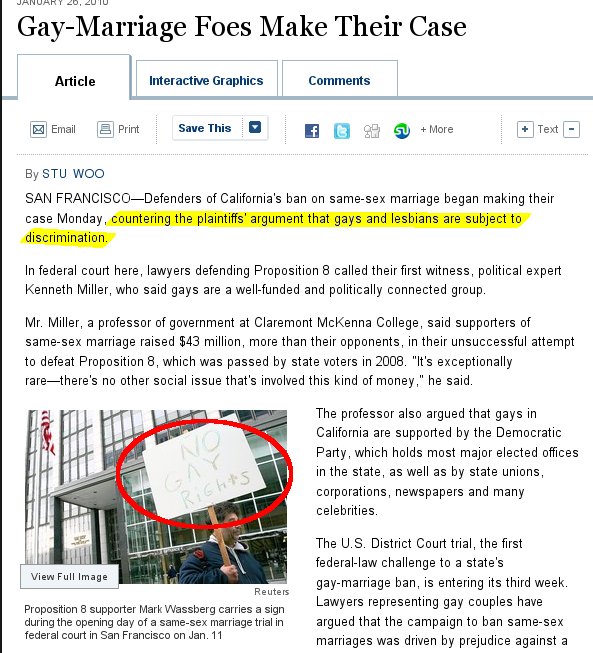As you’ve no doubt heard by now, the California Supreme Court
upheld
Proposition 8, which took away gays’ right to get married in that
state. This sucks, which obviously means that it constitutes judicial
activism. (Update, May 27: Yup: BillDo
describes
the suit as “homosexual radicals sought to do an end-run around the
democratic process and have unelected judges overrule the express will
of the people.“)
Okay, I realize that the question before the court wasn’t “should gays
be allowed to marry?”, but something more narrow, about whether the
referendum was phrased properly, in a way that doesn’t require the
legislature to intervene. I know nothing about California law, so I
can’t comment on whether I agree with the court on this more narrow
question.
While the court was debating this, of course, Connecticut, Iowa, Vermont, and
Maine moved to legalize gay marriage, and DC voted to recognize
marriages from other states. So I’m pretty confident that California
will follow suit soon enough.
Meanwhile, in Bizarro World the Weekly Standard, Sam
Schulman
presents
a novel argument against gay marriage. And by “argument”, I mean
“words and sentences furiously and randomly strung together in the
despearate hope that some of it might form an argument.” I can’t even
summarize it. Though if I had to, it’d probably be “`gay’ means happy,
and married people shouldn’t be happy”.
The fact is that marriage is part of a
much larger institution, which defines the particular shape and
character of marriage: the kinship system. […]
The first [effect of marriage within the kinship system] is the
most important: It is that marriage is concerned above all with female
sexuality. The very existence of kinship depends on the protection of
females from rape, degradation, and concubinage. This is why marriage
between men and women has been necessary in virtually every society
ever known. Marriage, whatever its particular manifestation in a
particular culture or epoch, is essentially about who may and who may
not have sexual access to a woman when she becomes an adult, and is
also about how her adulthood–and sexual accessibility–is
defined.
[…]
This most profound aspect of marriage–protecting and controlling the sexuality of the child-bearing sex–is its only true reason for being, and it has no equivalent in same-sex marriage.
That’s right, folks: if you’re a woman, and you marry another woman,
you’re not allowed to tell your wife that she’s not allowed to sleep
around. Glad that’s settled.
Second, kinship modifies marriage by imposing a set of rules that determines not only whom one may marry (someone from the right clan or family, of the right age, with proper abilities, wealth, or an adjoining vineyard), but, more important, whom one may not marry. Incest prohibition and other kinship rules that dictate one’s few permissible and many impermissible sweethearts are part of traditional marriage. Gay marriage is blissfully free of these constraints. There is no particular reason to ban sexual intercourse between brothers, a father and a son of consenting age, or mother and daughter. There are no questions of ritual pollution: Will a hip Rabbi refuse to marry a Jewish man–even a Cohen–to a Gentile man? Do Irish women avoid Italian women? A same-sex marriage fails utterly to create forbidden relationships.
Oh, noes! If teh gays are allowed to marry, we might get Irish and
Italians marrying! The horror!
Now to live in such a system, in which sexual intercourse can be illicit, is a great nuisance. Many of us feel that licit sexuality loses, moreover, a bit of its oomph. Gay lovers live merrily free of this system. Can we imagine Frank’s family and friends warning him that “If Joe were serious, he would put a ring on your finger”? Do we ask Vera to stop stringing Sally along? Gay sexual practice is not sortable into these categories–licit-if-married but illicit-if-not (children adopted by a gay man or hygienically conceived by a lesbian mom can never be regarded as illegitimate). Neither does gay copulation become in any way more permissible, more noble after marriage. It is a scandal that homosexual intercourse should ever have been illegal, but having become legal, there remains no extra sanction–the kind which fathers with shotguns enforce upon heterosexual lovers. I am not aware of any gay marriage activist who suggests that gay men and women should create a new category of disapproval for their own sexual relationships, after so recently having been freed from the onerous and bigoted legal blight on homosexual acts. But without social disapproval of unmarried sex–what kind of madman would seek marriage?
(emphasis added)
Do I detect someone with unresolved issues?
Few men would ever bother to enter into a
romantic heterosexual marriage–much less three, as I have done–were
it not for the iron grip of necessity that falls upon us when we are
unwise enough to fall in love with a woman other than our
mom.
Oh, and guess who’s going to be sleeping on the couch tonight:
Every day thousands of ordinary heterosexual men surrender the dream of gratifying our immediate erotic desires. Instead, heroically, resignedly, we march up the aisle with our new brides, starting out upon what that cad poet Shelley called the longest journey, attired in the chains of the kinship system–a system from which you have been spared. Imitate our self-surrender.
(emphasis added)
Believe it or not, there’s even more where that came from. As far as I
can tell, Schulman’s point is that marriage means something, and
people who choose to get married aren’t allowed to decide what their
marriage means or should be like, because… well, he doesn’t really
say. History, presumably. Or maybe quantum.
Furthermore, marriage is an unhappy affair, and gays should feel
relieved, rather than discriminated against, that they have been
spared it.
(via Tom Smith
and Sadly, No.)
